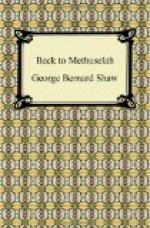THE ARCHBISHOP. Dear me! However, her death simplifies the situation, as I have been able to convince these gentlemen that the matter had better go no further.
MRS LUTESTRING. What! When the President knows! It will be all over the place before the end of the week.
BURGE-LUBIN [injured] Really, Mrs Lutestring! You speak as if I were a notoriously indiscreet person. Barnabas: have I such a reputation?
BARNABAS [resignedly] It cant be helped. It’s constitutional.
CONFUCIUS. It is utterly unconstitutional. But, as you say, it cannot be helped.
BURGE-LUBIN [solemnly] I deny that a secret of State has ever passed my lips—except perhaps to the Minister of Health, who is discretion personified. People think, because she is a negress—
MRS LUTESTRING. It does not matter much now. Once, it would have mattered a great deal. But my children are all dead.
THE ARCHBISHOP. Yes: the children must have been a terrible difficulty. Fortunately for me, I had none.
MRS LUTESTRING. There was one daughter who was the child of my very heart. Some years after my first drowning I learnt that she had lost her sight. I went to her. She was an old woman of ninety-six, blind. She asked me to sit and talk with her because my voice was like the voice of her dead mother.
BURGE-LUBIN. The complications must be frightful. Really I hardly know whether I do want to live much longer than other people.
MRS LUTESTRING. You can always kill yourself, as cook did; but that was influenza. Long life is complicated, and even terrible; but it is glorious all the same. I would no more change places with an ordinary woman than with a mayfly that lives only an hour.
THE ARCHBISHOP. What set you thinking of it first?
MRS LUTESTRING. Conrad Barnabas’s book. Your wife told me it was more wonderful than Napoleon’s Book of Fate and Old Moore’s Almanac, which cook and I used to read. I was very ignorant: it did not seem so impossible to me as to an educated woman. Yet I forgot all about it, and married and drudged as a poor man’s wife, and brought up children, and looked twenty years older than I really was, until one day, long after my husband died and my children were out in the world working for themselves, I noticed that I looked twenty years younger than I really was. The truth came to me in a flash.
BURGE-LUBIN. An amazing moment. Your feelings must have been beyond description. What was your first thought?
MRS LUTESTRING. Pure terror. I saw that the little money I had laid up would not last, and that I must go out and: work again. They had things called Old Age Pensions then: miserable pittances for worn-out old laborers to die on. I thought I should be found out if I went on drawing it too long. The horror of facing another lifetime of drudgery, of missing my hard-earned rest and losing my poor little savings, drove everything else out of my mind. You people nowadays can have no conception of the dread of poverty that hung over us then, or of the utter tiredness of forty years’ unending overwork and striving to make a shilling do the work of a pound.




